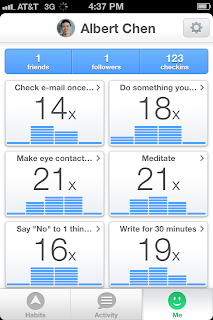Hi all! Just a quick update. This has been my most productive month yet (in my life), so I'll share my thoughts.
Back in June, I wrote a lot about:
***2) batching together less-important tasks so they don't become distractions while I'm trying to get actual work done
3) preserving time for daily habits
Since my last post, I've taken #2 to an extreme, through a process of experimentation. I also have updates on #1 and 3, but I will save that for a future post.
The result can be summarized as three rules:
Rule 1: Schedule as many small tasks as possible on "Batch Day"
Batch days are perhaps the most useful innovation in my schedule. I pick the day of the week I have the most meetings/appointments and tell myself, "I don't need to make any progress on my research that day." Instead, I get all of the little things I need to get done out of the way for the week. This includes personal errands: laundry, clearing out my e-mail, shopping, cleaning, organizing, bills, etc. It also includes all the little tasks around lab that I need to do on a regular basis, favors I need to do for other people, and generally any task that takes time and energy but not much thought.
Essentially, anything that does not move my project forward gets stuffed into this single day per week. These days end up being PACKED and I have no trouble exhausting myself by the end of the day. I usually don't finish everything, so I end up doing some "batch" tasks towards the end of other days of the week.
This is intended to avoid letting these small tasks interfere with my research. They are extremely dangerous because they feel like productivity, so they can easily be used as an excuse to avoid making progress on my projects. Whenever such a task gets presented to me during the week, I put it on the list for my next batch day (which may be up to 6 days later) and go back to work. I only do the task immediately if it takes less than 2 minutes or if it is extremely urgent.
Unexpectedly, I'm now far more on top of my responsibilities than I was before. Because one day per week is specifically designated for small tasks, I rarely procrastinate on them. When someone asks me for something, I can tell them I will do it next Wednesday. And it's easy to deliver.
Rule 2: Schedule meetings only for the busiest day of the week.
Look at the schedule below. If someone wants to schedule a meeting, I will reply as follows:
"Thursday is best. If that doesn't work, I might be able to do Monday at 11am or 1pm, or Tuesday at 8am."

To concentrate on my work and do it right, I need long stretches of time to focus. Therefore, Wednesday and Friday in the schedule above must be protected at all costs. Switching between projects or tasks is the best way to lose time in the day.
Rule 3: Check priority e-mail once a day after finishing my work, and the rest of my e-mail once a week.
Checking e-mail is the best way to lose focus. Therefore, I designate a specific time in the afternoon AFTER I've finished my most important tasks for the day to check e-mail. Even then, I only look at and respond to things that make it into my priority inbox. Once a week, usually on batch day, I will quickly process my e-mail and reach Inbox-Zero in about 30 minutes (including responses and small to-dos).
On processing:
I never leave an e-mail in my inbox after looking at it. I immediately do one or more of the following:
1) delete it
2) archive it
3) add event to my calendar
4) add task to my to-do list (usually on my batch day list)
5) write a note to myself and file it properly
6) respond as succinctly as possible





.JPG)












